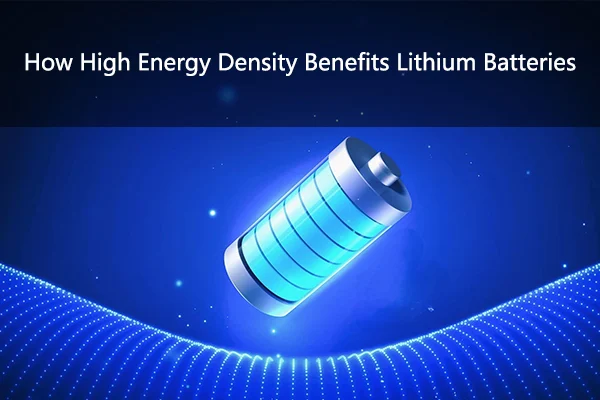When it comes to powering modern technology, lithium batteries owe much of their success to their high energy density. This essential feature allows them to store a significant amount of energy in a compact size, making them indispensable for a wide range of applications—from smartphones to electric vehicles (EVs) and renewable energy storage.
Let’s unpack how high energy density transforms lithium batteries into the powerhouse of today’s energy solutions.

What is High Energy Density?
Energy density refers to the amount of energy a battery can store relative to its size or weight, typically measured in watt-hours per kilogram (Wh/kg).
- Lithium batteries excel with energy densities ranging between 200–300 Wh/kg, surpassing traditional lead-acid or nickel-based batteries.
- This means more power in smaller, lighter batteries—perfect for devices where space and weight are premium considerations.
The Advantages of High Energy Density
1. Improved Device Performance
With higher energy density, lithium batteries can power devices longer without increasing size or weight.
- Portable Electronics: Lightweight, long-lasting batteries make smartphones and laptops more convenient.
- EVs: High energy density extends driving range, addressing "range anxiety" for electric vehicle owners.
Example: Tesla’s Model 3 leverages high-density lithium batteries to achieve ranges of over 350 miles on a single charge.
2. Space and Weight Efficiency
High energy density reduces the size and weight of batteries, which is crucial for applications like aerospace, drones, and wearables.
- Smaller Size: Compact batteries leave room for other components or reduce the overall size of devices.
- Lightweight: Less weight improves efficiency and performance, especially in EVs and aircraft.
Fun Fact: Ever wondered how drones stay airborne for extended periods? High-density lithium batteries are the secret!
3. Cost Savings Over Time
Though lithium batteries are more expensive upfront, their higher energy density lowers long-term costs:
- Fewer Batteries Needed: Devices can run longer with fewer cells, reducing overall material requirements.
- Reduced Maintenance: Durable lithium batteries last longer, minimizing replacement frequency.
4. Versatility in High-Energy Applications
High energy density expands the potential uses of lithium batteries, enabling innovative applications:
- Electric Vertical Takeoff and Landing (eVTOL): Emerging aerial vehicles rely on lithium batteries to combine light weight with high power.
- Renewable Energy Storage: Solar and wind systems use lithium batteries to store energy efficiently, even in compact setups.
- Medical Devices: From pacemakers to portable oxygen concentrators, lightweight lithium batteries save lives.
5. Environmental Benefits
By delivering more power with fewer resources, high-density lithium batteries contribute to sustainability:
- Lower Carbon Footprint: Efficient storage reduces the energy and materials needed for production.
- Recyclable: As recycling technology advances, lithium batteries can be reused, reducing waste.
Innovations Driving Higher Energy Density
Advances in materials science continue to push the boundaries of lithium battery energy density:
- Solid-State Batteries: Offering even higher densities and improved safety, they eliminate flammable liquid electrolytes.
- New Electrode Materials: Silicon anodes and lithium-metal cathodes promise significant performance boosts.
- Optimized Design: Improved cell architecture increases storage without adding bulk.
Case Study: Toyota’s research into solid-state batteries could lead to EVs with ranges exceeding 500 miles, all while reducing battery weight.
Thought-Provoking Questions
- How will advancements in solid-state lithium batteries redefine industries like aviation or energy storage?
- Could ultra-high-density batteries pave the way for portable fusion or quantum computing power sources?
High energy density is the backbone of lithium battery innovation. It enhances everything from your smartphone’s battery life to the efficiency of electric vehicles. As technology advances, the future promises even more powerful, lightweight, and sustainable energy solutions—all thanks to the ongoing evolution of high-density lithium batteries.
 SolarInfo
SolarInfo